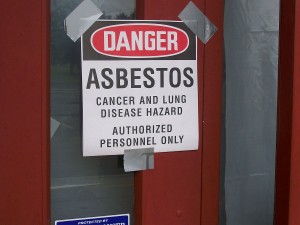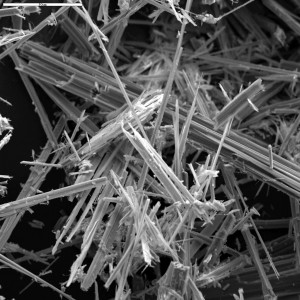
Drexel University facilities are currently working to eliminate asbestos insulation that was identified around pipes in the office of professor Rachel Reynolds. Her office sits on the eastern side of the Psychology, Sociology and Anthropology building. The building has historically had problems with asbestos, so when Reynolds was talking with a colleague and mentioned she thought the insulation might be degrading, the two thought it best to have the situation checked right away.
“We called facilities and they sent somebody over right away to run a check on it and it is,” Reynolds said.
“Upon hearing about the debris, we sent someone from the Office of Environmental Health and Safety to inspect it, find its source and immediately cleaned the debris up. Air quality tests were also conducted that showed the office was safe for re-occupation,” Jon Chase, Drexel facilities’ executive director of health and safety wrote to The Triangle.
“As an added precaution, the University will have the asbestos insulation on all pipes removed. The abatement will begin after the 10-day notification period that is required by law. During this time, the City and Commonwealth will also inspect the building and the removal plan,” Chase’s statement continued.
The pipes in the PSA building stretch from the building’s floor to ceiling, enclosed in insulation containing asbestos. The building was acquired by Drexel in 1977, when asbestos was a mineral still widely used as a fire-resistant and insulating material. Chase noted that it is common for most buildings that were renovated or built before 1980 to contain forms of asbestos as a building material.

Asbestos is a silicate mineral that that does not pose a health hazard to humans, unless in particulate form. Inhaling asbestos particles can cause diseases such as asbestosis, lung cancer and mesothelioma. When asbestos materials are largely intact, they pose no inherent health hazards. The insulation around the pipes in the PSA only began to pose a hazard as it degraded and released asbestos particles into the air.
“At Drexel, our first priority is a safe and healthy environment for our students, faculty and staff. The debris found in professor Rachel Reynolds’ office came from loose pipes within her office,” Chase wrote. “There is no health risk from asbestos as long as the materials that contain it remain undisturbed.”
The PSA building has faced problems with asbestos in the past. A portion of the basement has been sealed off to contain high asbestos particulate matter. It is also known to be the site of a 1947 radium spill when the building was occupied by the American Oncologic Hospital. Due to poor cleanup efforts on behalf of the hospital, some areas of concrete in the PSA building are still exhibiting signs of radium contamination, though the low levels are less than or equal to Philadelphia’s standards for chemical radiation.
In order to keep the building’s occupants safe and unexposed to any asbestos, all abatement is scheduled to occur on nights and weekends, when the building is vacant. After the abatement is complete, Chase said that the health and safety department will repeat air quality tests to ensure there is no trace of asbestos in the air within the building.
Greg Niedt, a graduate student at the University, goes to the PSA building every day. He saw health and safety workers testing for asbestos a few weeks ago while he was in the building but said it was comforting to know Drexel was taking the matter seriously.
“I was here when they were testing for asbestos one day so while I feel obviously concerned about any potential health risk it’s good to know that they’re at least addressing it. I have confidence in their ability to handle the situation,” Niedt said.
“I’m happy with Drexel’s response they didn’t drag their feet,” Reynolds said on the subject.
Chase indicated that the University is taking every step it can in order that the building can continue to be a safe place to work.

